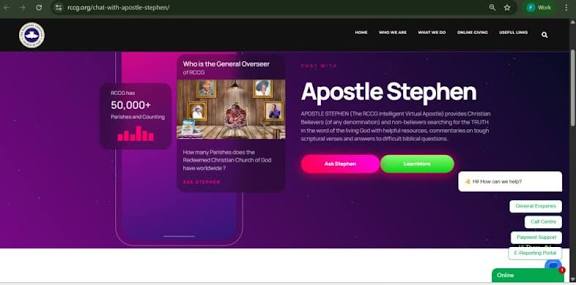Pewbeam AI: Where Faith meets Innovation

AI is even closer to the Devil's box than the television — but churches are open to it. This assertion came following the subtle use of AI in places of worship.
There's a belief that the devil's box which refers to a long-standing skepticism within religious communities towards new technology has taken form in Artificial intelligence. Historically, when television first became widespread in the mid-20th century, many conservative Christian groups labelled it "the devil's box" alleging that it would be used to promote immorality, and distract believers from their spiritual life.
The phrase stood as a symbol of fear — warning Christians that such technology would corrupt their faith and values by replacing actual spiritual engagement with entertainment or misinformation.
Today, this same belief has been attributed to emerging technologies like Artificial intelligence. In certain faith spaces, AI is now viewed with suspicion because of its human-like reasoning and “creation” aspect — qualities that some interpret as playing God. When Dára Sobaloju said AI is “even closer to the devil’s box than TV,” he was highlighting this tension: that many people still see AI as something spiritually dangerous.
THE BIRTH OF PEWBEAM AI
While skepticism remains about the use of AI in churches, various innovative projects are coming up to challenge this doubt and one of them is Pewbeam AI. Pewbeam AI was designed to solve a problem in real time — the founder Dara Sobaloju noticed something during sermons.

In an interview video uploaded to various social media platforms, we're made to understand the problem that Pewbeam was created to solve.
According to him, most pastors face a significant challenge during sermons — they call out a line of scripture often paraphrased and the media team takes a good amount of time to get it on the screen, thus, interrupting the flow. The time used to get the right scripture and upload could he significantly reduced by AI, Dara thought.
Latest Tech News
Decode Africa's Digital Transformation
From Startups to Fintech Hubs - We Cover It All.
This led him to take decisive actions towards making this Idea a reality. Apparently, Sobaloju had been nursing the ideas for about 2 years, and it simply remained wishful thinking until his friend Tony Deoye joined him as a brand designer.
On August 21, Dara Sobaloju posted on X what he thought would be just another tweet;
"I want to build a bible presentation AI agent for church use. Imagine Bible verses coming up on screen as the Pastor preaches just based on what he’s talking about or his paraphrases and quotes.
I want to build this completely in public, starting today. Thoughts?"
The tweet struck a chord and before he could understand what had happened, people were all in the comments giving suggestions, encouragement and questions that would help better the platform. Pastors, developers, Christians and lots others were invested in ensuring that his idea becomes a reality.
Since then, Sobaloju has been documenting his progress on Pewbeam AI, an agent designed to listen to sermons in real time and project relevant verses on screen.
Sobaloju's goals for Pewbeam were shaped by Nigerian realities which he believed to be the harshest conditions noting that if it could work here, it could work anywhere. Some things he had to consider were poor internet coverage, unreliable power, and varying hardware capacity.
Latest Tech News
Decode Africa's Digital Transformation
From Startups to Fintech Hubs - We Cover It All.
To meet that challenge, he’s focused on three layers: speech-to-text in real time with minimal delay, offline-first design with optional connection, and contextual accuracy to ensure the verse matches the preacher’s intent.
To achieve his goal, Dara and his team made use of Faster Whisper, an optimised version of OpenAI’s voice recognition model, to match verses. The system also supports ‘direct call’: when a pastor calls a verse, it pops up instantly.
The hurdles in building Sobaloju’s AI agent were evidently significant. The models must be lightweight enough to run on everyday laptops, yet accurate enough to avoid mismatched scripture. “When the pastor is talking about something, there might be several references to it in the Bible,” he explains. “The challenge is making sure the right one comes up in real time.”
Still Sobaloju remained optimistic and this was rewarded following it's first testing at CCI Global, Ibadan were it was reported to have been successful in achieving it's goal of displaying bible verses in real time — not from preloaded slides but words of the Pastor.
Having succeeded, Sobaloju's aim is to adopt a model similar to that of YouVersion bible app where users donate so others can download for free. This model developed by a USA-based church, Life Church has given users the opportunity to access the app for free.
In the long term, Sobaloju believes Pewbeam can adopt a model where more affluent churches pay subscription fees so that smaller churches can access the tool for free. “I’ve learnt that if something is good, it is worth paying for,” he says, explaining that big churches will definitely want to pay for a service that solves problems.
A WAVE OF AI BUILDERS IN CHURCH
Dara Sobaloju isn't the only one making waves in AI complementing Faith projects — he is one of many innovators doing so.
Latest Tech News
Decode Africa's Digital Transformation
From Startups to Fintech Hubs - We Cover It All.
In recent years, Nigerian churches have begun experimenting with AI in their own ways. In 2025, the Deeper Christian Life Ministry launched Ask Kumuyi, an AI chatbot that fields questions about sermons from its General Superintendent, Pastor W.F. Kumuyi.
The Redeemed Christian Church of God (RCCG) created an AI chatbot, Apostle Stephen, which greets users with: “Hi there, I am Apostle Stephen, the RCCG Digital Missionary. How may I help you today?”

What makes Pewbeam distinct from the above ideas, however, is Sobaloju's imagination the different applications of AI in churches; tools that don’t just answer questions but solve problems in real-time during services.
Sobaloju’s Pewbeam AI wants to address a problem he’s seen many times: a preacher misquotes or paraphrases scripture, and the disruption derails the flow of the message.
“I saw firsthand how it disorients the speaker,” Sobaloju says. “For this to work, there needs to be voice input. The idea is to leverage AI so that when the pastor paraphrases something, the system picks it up and puts the right scripture up in real time.”
Ultimately, the growing tension between Faith and technology is been deterred by projects like Pewbeam — demonstrating that the Church can embrace digital tools without losing its spiritual depth.
You may also like...
Bundesliga's New Nigerian Star Shines: Ogundu's Explosive Augsburg Debut!

Nigerian players experienced a weekend of mixed results in the German Bundesliga's 23rd match day. Uchenna Ogundu enjoye...
Capello Unleashes Juventus' Secret Weapon Against Osimhen in UCL Showdown!

Juventus faces an uphill battle against Galatasaray in the UEFA Champions League Round of 16 second leg, needing to over...
Berlinale Shocker: 'Yellow Letters' Takes Golden Bear, 'AnyMart' Director Debuts!

The Berlin Film Festival honored
Shocking Trend: Sudan's 'Lion Cubs' – Child Soldiers Going Viral on TikTok

A joint investigation reveals that child soldiers, dubbed 'lion cubs,' have become viral sensations on TikTok and other ...
Gregory Maqoma's 'Genesis': A Powerful Artistic Call for Healing in South Africa

Gregory Maqoma's new dance-opera, "Genesis: The Beginning and End of Time," has premiered in Cape Town, offering a capti...
Massive Rivian 2026.03 Update Boosts R1 Performance and Utility!

Rivian's latest software update, 2026.03, brings substantial enhancements to its R1S SUV and R1T pickup, broadening perf...
Bitcoin's Dire 29% Drop: VanEck Signals Seller Exhaustion Amid Market Carnage!

Bitcoin has suffered a sharp 29% price drop, but a VanEck report suggests seller exhaustion and a potential market botto...
Crypto Titans Shake-Up: Ripple & Deutsche Bank Partner, XRP Dips, CZ's UAE Bitcoin Mining Role Revealed!

Deutsche Bank is set to adopt Ripple's technology for faster, cheaper cross-border payments, marking a significant insti...
